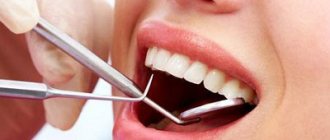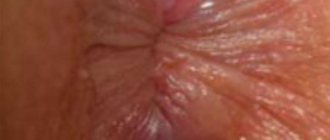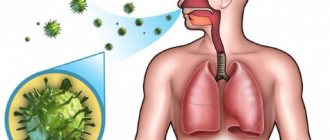Gums hurt during pregnancy: what to do, how to treat and what to rinse your mouth with when it’s inflamed?
Pregnancy is a special period in the life of every woman. At this time, the body experiences a heavy load: hormonal levels gradually change, a lack of vitamins appears and immunity decreases. One of the diseases that plagues most expectant mothers is gingivitis - inflammation of the gums. It causes discomfort during eating, brushing teeth and can provoke the development of serious complications. Is it possible to treat inflammation during pregnancy and how safe will it be for the baby?
Causes of gum pain during pregnancy
Most women during pregnancy complain of gum inflammation. The problem occurs due to a number of reasons:
- Hormonal changes. This process leads to decreased immunity and weakening of gum tissue. The mucous membrane becomes more sensitive and vulnerable - even a small scratch can cause extensive inflammation.
- Toxicosis. Gastric juice, rising up the esophagus due to heartburn or vomiting, increases acidity in the oral cavity - this is an ideal environment for the proliferation of pathogenic flora.
- Vitamin deficiency. The beneficial substances a woman receives from food are mainly used for the development of the fetus, as a result of which they are absorbed in insufficient quantities by the expectant mother’s body.
- Changing your diet. If a woman is pregnant, she can take gastronomic liberties by eating a lot of sweets and baked goods. These foods contain fast carbohydrates, which are a good breeding ground for bacteria.
- Plaque on teeth. Failure to sanitize the oral cavity in a timely manner and the presence of soft and hard deposits on the teeth provoke irritation and inflammation of the soft tissues.
- Dental problems. Inflammation of the gums can be caused by a chipped crown, unexpected growth of a wisdom tooth, injuries due to an incorrect bite or an incorrectly installed filling.
- Failure to comply with hygiene rules. Many expectant mothers neglect brushing their teeth because brushing makes them gag. They are limited to rinsing the mouth with water.
Treatment regimen
Establishing a diagnosis
If a pregnant woman has sore gums, the first thing you need to do is find out the cause of the discomfort (see also: what to do if your gums hurt when you have a cold?). For ordinary inflammation that affects one or more areas of the mucous membrane, a specialist will conduct a visual examination. In chronic forms of gingivitis or the presence of ulcers, a microbiological examination of a plaque smear is required. In cases where the inflammatory process has spread to one or both jaws, a more detailed examination of the patient is necessary. The specialist may prescribe:
- blood test for sugar or HIV;
- general clinical blood test;
- ultrasound examination of the peritoneum;
- Wasserman reaction;
- consultation with an ENT specialist;
- radiography, etc.
Treatment by a doctor
If a woman is bothered by gum inflammation during pregnancy, it will be quite difficult to eliminate the problem on her own. It is better to trust a professional who will conduct treatment in a dental office and prescribe medications to continue therapy at home. Several treatment methods are used in the clinic:
- Filling. If the problem was caused by poorly installed fillings or caries, the doctor will be able to fix it. The use of anesthetics is not recommended, but in case of urgent need, it is allowed to use products based on articaine hydrochloride. It is best to remove or implant units after childbirth.
- Professional cleaning. This is a must when treating the inflammatory process. The stone can irritate the mucous membrane, injure it and lead to receding gums. Ultrasound is usually used to remove deposits, but it is contraindicated during pregnancy. The doctor will remove the plaque mechanically, after which he will polish the enamel.
- Washing for periodontitis. If large pockets with purulent contents form, the woman will have to visit the dentist to clean the area between the gums and teeth.
- Additional treatments. For serious illnesses, the doctor may prescribe electrophoresis or paraffin compresses with Mexidol. Therapeutic dressings with heparin ointment or the drug Vulnuzan are also used - the products are added to artificial dentin, which is applied to the edge of the gum.
Severe forms of the disease may require a course of treatment using injections of sclerosing solutions, as well as surgical correction of the gum edge. This therapy is carried out after childbirth so as not to harm the baby growing in the womb.
Medicines
Gum inflammation during pregnancy is treated in a more gentle way than in other patients. The therapy should not harm the child, so safe drugs are usually used to treat pregnant women:
- Antiseptics Chlorhexidine, Iodinol, Rotocan. The products help fight pathogenic flora, which is the main cause of gum disease. A woman should rinse her mouth several times a day, performing each procedure for at least 1 minute.
- Preparations for treating gums Miramistin, Tantum Verde spray, Levomekol and Vinilin ointment. They reduce inflammation, help destroy microbes and have a wound healing effect.
- Lizobakt and No-spa tablets are used to eliminate pain - they are absolutely harmless. Nurofen can be used in the 1st and 2nd trimester and only with a doctor's permission.
In order to relieve inflammation and reduce discomfort, it is most convenient to use gels. They can be rubbed into the gums or used to create bandages. In dentistry the following are used:
- Metrogyl Denta - helps destroy pathogenic flora.
- Cholisal - not only blocks inflammation, but also eliminates pain. The product quickly penetrates into the deep layers of tissue, but during pregnancy it should be used extremely carefully.
- Asepta - effectively fights inflammation, reduces bleeding gums, but is used by pregnant women only after consultation with a specialist.
Additional Tips
When the gums recede too much from the tooth and pus appears, you need to rinse your mouth with sesame oil - this is an effective and anti-inflammatory remedy that helps not only eliminate, but also prevent a lot of dental problems. This healing liquid cleanses plaque from teeth and soothes soft tissues. To prevent your gums from itching and pain, rinse your mouth with 50 ml of sesame oil for 10 minutes 2-3 times a day. After completing the procedure, spit out the liquid and rinse the mouth with warm water.
Regular use of dental floss helps remove food debris and accumulated plaque in hard-to-reach places, which means preventing gum inflammation
Important! A proper balanced diet is a measure that will protect a pregnant woman from any dental problems. In particular, it is necessary to ensure that the daily menu contains a sufficient amount of foods with vitamin D - this substance has anti-inflammatory properties and also ensures better absorption of calcium (the “guarantor” of strong bone tissue).
Prevention
Simple preventive measures will help prevent gum inflammation during pregnancy:
- Teeth brushing should be done twice a day. It is advisable to use not only a traditional brush and toothpaste, but also floss, interdental brushes and mouthwash.
- The diet should contain large quantities of fresh vegetables and fruits. Regular consumption of solid foods will strengthen your gums.
- It is better to exclude sweets and sticky foods from the menu.
- In case of toxicosis, it is necessary to restore acidity in the oral cavity. To do this, after vomiting, you need to rinse your mouth with a soda solution (we recommend reading: How can you rinse your teeth with a toothache at home?).
- It is important to saturate the body with vitamins and minerals. A woman receives some of them from food, but during pregnancy it is better to increase the “volumes” of consumed nutrients by taking pharmacy vitamin complexes.
- You should avoid stress, get more rest and spend a lot of time outdoors.
To minimize the risk of inflammation, you need to stock up on quality hygiene items. To relieve inflammation, you can add Forest Balm mouthwash to your arsenal, to prevent bleeding gums, use Parodontax or Lacalut toothpaste, and to combat plaque, use ROCS paste
Home treatment
You can also “calm down” loose, inflamed soft tissues of the oral cavity with folk remedies. Natural compounds stop the inflammatory process, relieve pain, and eliminate bleeding gums. So, over-roasted coffee beans are ground in a coffee grinder. One tablespoon of the resulting powder is combined with 2 tbsp. l. powdered sugar, spread the mixture on a cotton swab and carefully apply it to the “affected” area, massage lightly. This gum treatment is complemented by rinsing with an aqueous solution of calendula.
Why do gums become inflamed during pregnancy?
The oral cavity always contains various kinds of microparticles (food debris, pathogenic and non-pathogenic microorganisms, salivary gland secretions). Eating solid foods or getting burned while eating hot foods can lead to the development of local inflammation in the damaged area. This indicates that pathogenic microflora has entered the wound pocket.
The appearance of inflammation - gingivitis - is associated with the state of the immune system . Most often, pregnant women whose immunity is weakened are susceptible to the development of gingivitis.
Hormonal changes are one of the main reasons for a decrease in the immune system. In the first trimester of pregnancy, the level of the hormones progesterone and gonadotropin increases, which make their changes to the structure of the oral mucosa. Of 100% of all pregnant women, 20% suffer from gum inflammation due to hormonal changes.
Pathological pregnancy , which is difficult for both the mother and the fetus, increases the risk of developing gum disease.
In addition, the causes of the development of the disease will be:
- Poor oral hygiene (future mothers prefer rinsing rather than brushing their teeth, which increases the growth of pathogenic microorganisms).
- Impaired taste (consuming large amounts of sweet, sour, salty foods in the diet).
- Reduced levels of vitamins during pregnancy (one of the reasons for weak immunity).
- Acute or chronic concomitant diseases of other organs and systems during pregnancy (acute appendicitis due to the growth of the pregnant uterus, etc.).
- General toxicosis of the mother - increased acidity of the secretions of the salivary glands and stomach, irritating the gums.
During pregnancy, two types of gum disease often occur: gingivitis and periodontitis.
Types of inflammation
Symptoms of the disease usually begin in the early stages of pregnancy. Dentists distinguish between catarrhal and hypertrophic inflammations. In very advanced forms, peptic ulcer disease develops. Bleeding gums during pregnancy, as a rule, begins in the early stages.
Catarrhal inflammation of the oral cavity manifests itself in the appearance of a huge amount of dental plaque. Next, the gums become swollen and begin to bleed. Bleeding indicates an advanced form of the disease. If such a disease is not eliminated in time, harmful microorganisms will spread to the entire oral cavity.
During catarrhal inflammation it is very important to maintain personal hygiene. If this is not done, then the inflammation becomes complex and becomes hypertrophic. As a rule, women are susceptible to this disease at 20 weeks of pregnancy. Hypertrophic inflammation is characterized by significant swelling of the gums. This disease can even lead to the loss of teeth, which become loose under the influence of bacteria. With hypertrophic inflammation, gums bleed during pregnancy.
Infectious diseases reduce the protective function of the female body. An infection that enters the oral cavity can lead to the formation of ulcers. Gums bleed during pregnancy also in the presence of infectious diseases. The most difficult period for pregnant women is considered to be carrying a child in the last months. During this period, pregnant women are more susceptible to infections. Therefore, in the third trimester it is very important to follow all doctor’s instructions and protect yourself from all kinds of infections.
During this period, a woman is exposed to various stresses, which can also lead to peptic ulcers. The disease is characterized by the appearance of ulcers, bleeding and swelling.
If your gums become inflamed during pregnancy, you should immediately consult a dentist, because such a disease can only be treated with medications prescribed by a doctor. Medicines for gum inflammation should be as harmless as possible for both mother and baby.
Establishing a diagnosis
In order to understand whether there is gum inflammation during pregnancy or not, you need to know a number of signs:
- redness or bluishness of the oral mucosa;
- swelling of the gums during pregnancy;
- bleeding gums;
- discomfort (itching, numbness, pain, irritation) in the oral cavity, aggravated by eating and touching;
- bad breath;
- increase in intoxication syndrome (increased body temperature, increased weakness) against the background of redness of the gums.
It is important to understand that when signs of inflammation occur, the gums become hypersensitive.
If such symptoms are detected, it is necessary to urgently seek advice from a dentist. At the medical stage, laboratory and instrumental diagnostics of the oral cavity will be carried out, and an appropriate diagnosis will be established.
Diagnosis of the disease
The diagnosis of inflammation of the gums or ligaments is established by a dentist after the following procedures:
The diagnosis of inflammation of the gums or ligaments is established by a dentist after the following procedures:
- Finding out the medical history. At the first visit, the specialist asks how the pregnancy is going, do your gums hurt a lot or a little? The doctor must also determine the dynamics of the pathological process, the duration of clinical symptoms and the severity of general intoxication.
- Examination of the oral cavity. The dentist uses a special probe and mirror to examine the hard and soft tissues of the maxillofacial area. At this stage, the specialist is ready to establish a preliminary diagnosis, which still needs to be confirmed by other diagnostic techniques.
- Palpation. During the examination, the doctor feels the swollen area of the face and regional lymph nodes.
- X-ray of the oral cavity. If your gums and teeth hurt during pregnancy, then it is advisable to carry out an X-ray examination in the second trimester, which allows you to minimize the risks of X-ray exposure. In addition, this examination is most effective for periodontitis.
- Laboratory analysis of gingival fluid. Bacteriological examination of the oral cavity determines the quantitative and qualitative composition of the microflora.
- Biochemical and detailed blood test. General intoxication of the body is reflected in a general blood test.
Instrumental examination of the oral cavity
How to treat gum disease during pregnancy
If the problem is not related to a deterioration of the immune system, then treatment of pregnant gums will be gentle. Such a patient should not worry about the safety of her health and the health of the baby, because cleaning the oral cavity is carried out using non-aggressive medications.
- If the reasons for the development of gingivitis are minor problems - caries (dental plaque) or tartar, then the teeth will be treated with antiseptics and subsequent cleaning.
- In the case of reduced immunity, against the background of which inflammation of the gums has developed, removal of the rotten tooth as a source of infection and maintenance therapy (taking antiseptic and anti-inflammatory drugs), as well as vitamins, are indicated.
- Mouth rinses with medicinal properties, gels and ointments are shown.
- A useful addition to the main treatment would be to prescribe hydromassage to the gums to improve blood circulation in the tissues of the mucous membrane and, as a result, speed up the recovery period.
Dental gels and ointments for pregnant women
The indication for the use of medicinal gels and ointments for pregnant women will be their pronounced analgesic and anti-inflammatory properties.
Gel for gums during pregnancy, in turn, is more effective in relieving inflammation than mouth rinses. The gel remains on the surface of the inflamed gums for a long time, while the rinse only acts while rinsing the mouth.
A common balm for sore gums is Asepta . This drug has an antimicrobial and anti-inflammatory effect, which accelerates the process of regeneration of damaged gum areas. You can also use Metrogil-dent .
Ointments have a similar effect as gels. One of the brightest representatives of this form of drugs is the ointment “ Levomekol ” or its analogue “Levosin”.
Rinse aids
The dentist will tell you what to do if your gums become inflamed during pregnancy. His first decision will be to eliminate the inflammation as soon as possible. Listerine line rinse aid or another manufacturer can best cope with this .
It is important to remember that rinse aid alone will not eliminate inflammation. In between rinses, the pregnant woman is prescribed medicinal ointments or gels to improve the quality of treatment.
Traditional recipes for inflammation and bleeding gums
Traditional medicine is aimed at relieving gum inflammation and reducing pain. Symptoms of gingivitis can be relieved with infusions of medicinal plants such as chamomile , St. John's wort , and calendula .
Some pregnant women, to enhance the anti-inflammatory effect, add solutions of chamomile and sage to the rinse with the main drug. This helps reduce discomfort for a long time.
A simple method of treatment is to rinse your mouth with table salt (1 tablespoon) dissolved in a glass of boiled water. For an antimicrobial effect, you can add propolis.
Is treatment possible with antibiotics?
Antibiotics are difficult drugs for the human body, especially during pregnancy, since their uncontrolled use entails irreversible consequences for the child, namely developmental defects in the future.
It is possible to take antibiotics , but only with the permission of the attending gynecologist or dentist if there are appropriate indications (for intoxication syndrome). It is the doctor who will select the right group of antibiotics and advise how to treat this condition.
Features of gum treatment after childbirth
Inflammation of the gums during pregnancy requires complex treatment, and it will continue in the postpartum period. First of all, it is necessary to get rid of dental problems if they cause pain and bleeding of the gums. A trip to the dentist can solve these problems and then the treatment of gums will take the form of symptomatic therapy.
Read also: A white lump appeared on the gum
If the primary damage to the gums itself is due to infection by microorganisms, then you need to use an arsenal of anti-inflammatory and antiseptic agents. All of these products are widely available in pharmacies, but before purchasing, you should visit a doctor to select medications based on physiological characteristics.
If after childbirth there is no improvement during treatment, then it is necessary to examine the woman for problems with the immune system (we recommend reading: what to do if your gums bleed after childbirth?). You can prescribe her restoratives that can stimulate the immune system of a nursing mother.
Pregnancy gingivitis (gum inflammation)
Girls, I am faced with this terrible problem. My teeth are fine, dentists always praise me :) But with pregnancy, I began to chew nuts often, especially at night when I wake up. And over time, I began to notice pain in the gums on one side. Switched to another. Now the other one is even worse.
I can hardly eat, my teeth ache, my gums are inflamed, and extensively. I became interested in this problem. It turned out that it is very common among pregnant women and I’m not the only one! (I always take care of my teeth, brush them twice a day, I have never had any problems with my gums before). If anyone has also encountered this problem, read this. I found a very useful article! Don't get sick :) We'll give birth soon. ))
P.S. Who also suffers from gums - write how you cope! :)
Gingivitis today is considered one of the most common gum diseases and is a chronic inflammatory process of the gum tissue without disrupting the connection of the tooth with the gum and alveolar tissues.
Gingivitis in pregnancy is one of the most common types of gingivitis, characterized by an excessive increase in the volume of gum tissue, as a result of which it is also designated as hypertrophic gingivitis.
Causes of the disease
Pregnancy gingivitis is associated with hormonal changes in a woman’s body caused by pregnancy.
Hormonal changes in a woman’s body during pregnancy are very significant. They are caused by the influence of hormones such as progesterone, somatomammotropin, gonadotropin, etc., produced by the placenta and fetus. The production of these hormones occurs throughout almost the entire pregnancy, decreasing only before childbirth.
If pregnancy proceeds without complications, hormonal changes do not cause negative changes in the body of the expectant mother. However, even with uncomplicated pregnancy, gingivitis occurs in more than 20% of women. In the case of a complicated pregnancy, this figure is noticeably higher.
However, most often gingivitis in pregnant women is caused by the same general causes as regular gingivitis. It’s just that in a state of pregnancy, the female body is more open to the occurrence and development of inflammatory processes. Only about 2% of gingivitis is caused by pregnancy itself.
Dentists also name hypovitaminosis (lack of vitamins), metabolic disorders and toxicosis caused by pregnancy as causes of gingivitis in pregnant women.
Gingivitis in pregnant women can develop as early as the first or second month of pregnancy and progress until childbirth. Moreover, in the second and third trimesters of pregnancy, gingivitis can become a chronic disease.
Symptoms
The main symptoms of gingivitis in pregnant women:
- Excessive enlargement (proliferation) of gums and gingival papillae, partially covering the surface of the tooth crowns
- Swelling and redness of the gums
- Pain in the gum area, increasing with palpation
- Bleeding from the gums (especially when brushing teeth)
- Excessive plaque deposits
- Bad breath
- Difficulty eating food (especially solids)
Gingivitis during pregnancy, as well as ordinary hypertrophied gingivitis, can be of three degrees:
- Mild degree, in which the gum covers approximately a third of the tooth crown
- Average degree, at which the gum covers up to 50% of the tooth crown
- Severe degree, in which more than half of the tooth crown is covered by gum.
Treatment of gingivitis in pregnant women
Treatment of gingivitis in pregnant women is a set of procedures aimed at eliminating both the consequences of the disease and the causes that caused it.
It should be borne in mind that it is best to treat gingivitis in pregnant women in the early stages of pregnancy in order to minimize the negative impact on the expectant mother and her fetus.
Moreover, even before pregnancy, it is advisable to carry out a number of therapeutic measures (treatment of teeth and gums) in order to reduce the future development of gingivitis.
Regardless of the specific cause of gingivitis in pregnant women, treatment of the disease necessarily begins with professional teeth cleaning, which removes dental deposits (plaque and tartar).
In the future, anti-inflammatory therapy is required with the help of special drugs and agents that normalize vascular tissue permeability (heparin ointment, 3% acetylsalicylic acid ointment, etc.).
To restore the normal size of the gums, drugs such as lidase, glucose, and novembiquin are used.
In addition, in the process of treating gingivitis in pregnant women, massage procedures, darsonvalization, as well as medicinal electrophoresis are performed.
During treatment, patients are advised to normalize their diet, in particular to increase the proportion of vitamins in the diet.
In extreme cases, with gingivitis in pregnant women, a surgical operation to remove hypertrophied gum tissue (gingivectomy) can be performed under local anesthesia.
An important role in the treatment of gingivitis is also played by the treatment of common diseases that contribute to the development of gingivitis.
Initial symptoms of the disease
Most often, initial symptoms begin to appear closer to the fifth month of pregnancy. This occurs due to the fact that the growth rate of the fetus increases, and for this it requires a lot of vitamins and microelements.
- Initial symptoms include the appearance of bleeding gums when brushing your teeth daily, the gums hurt, swelling, redness of the mucous membrane and, possibly, the formation of plaque on it. It is because of plaque that subsequent infection, erosion of the mucous membrane and the development of inflammatory processes occur.
- Very often a woman does not attach much importance to these symptoms and they begin to progress. Bad breath, bloody and purulent discharge appears, the temperature may even rise, and the submandibular lymph nodes become enlarged, which are signs of serious inflammation.
- As the disease progresses, gingivitis can acquire a hypertrophic form. It consists in the growth of gingival papillae. The hypertrophic form of gingivitis is especially noticeable in the area of the front teeth and in places where the edges of fillings and crowns overhang, which injure the gums. Hypertrophic gingivitis has two forms: edematous and fibrous: with the edematous form, the gingival papillae grow polypically, become soft and acquire a loose structure;
- with the fibrous form, the papillae also enlarge, but at the same time they become dense to the touch.
Bleeding while brushing teeth
Bleeding gums during brushing is associated with purely mechanical damage.
As mentioned above, often during pregnancy the mucous membrane becomes somewhat thinner and more tender than it was before. In most cases, this is due to a lack of vitamins and minerals. The thinner the mucous membrane, the more easily it is damaged when brushing your teeth. The cause may also be a toothbrush that is too hard, which damages the gums with its bristles. Improper brushing technique and improper use of dental floss can also lead to bleeding.
Another cause of bleeding can be a disease such as periodontal disease. With periodontal disease, the gum does not fit tightly to the tooth, and because of this, even when using a soft toothbrush, it can become damaged and begin to bleed.
Pain while eating, especially solid foods
Pain when eating hard foods, as well as when brushing teeth, is associated with mechanical damage to the gums. Solid food particles scratch the mucous membrane, causing pain and discomfort. Food that is too dense and hard can damage even healthy gums, let alone the mucous membrane of a pregnant woman, which is susceptible to the influence of hormones.
The damage described can be caused not only by food that is too hard, but also by food that is too hot. It provokes thermal burns of the gums and tongue and causes severe pain, so you should be more careful when consuming hot drinks and foods.
Other signs of gum disease
One of the signs of the so-called “pregnancy gingivitis” is a change in the color of the gums, its redness and swelling. The disease occurs in approximately 40% of pregnant women and is caused by toxins from bacteria that inhabit the oral cavity. The gums first become bright red and increase in size, and then, if the doctor’s recommendations are not followed, they become smaller and partially fibrotic. Untreated gingivitis can even lead to toxins entering the bloodstream and negatively affecting the fetus.










